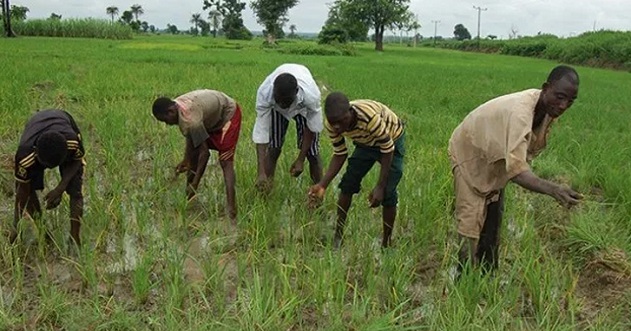Business
Nigeria now Africa’s biggest rice-producing nation –Agric minister

Nigeria has become Africa’s biggest rice producer, Minister of Agriculture and Rural Development Sabo Nanono said in Abuja on Tuesday at an occasion commemorating the 2020 World Food Day.
“Significant progress has been made to improve agricultural productivity since the inception of the present administration.
“To boost food security, Nigeria has curbed imports and has established a robust rice production programme to encourage more rice production at home.
“Efforts in this direction are starting to show results as Nigeria is now Africa’s largest producer of rice. The country is also the largest producer of cassava in the world,” Nanono said.
The central bank barred access to foreign exchange aimed at facilitating rice importation in 2015, a drive targeting self-sufficiency, and has backed loans worth as least N40 billion to help smallholders ramp up output.
Government also went ahead to prohibit rice imports though land borders and kept huge 70 per cent tariffs on imports through ports.
But the Buhari administration’s interventionist reforms in food production has been accompanied by a myriad of teething problems as import control measures have kept prices artificially high and farmers face elevated operating costs of processing paddy at mills.
Cultivating paddy fields has been limited by low investment in irrigation, roads, storage as well as mechanisation.
The Food and Agriculture Organisation has said less 1 per cent of Nigeria’s farmland is irrigated compared to a global average of more than 20 per cent.
Read also: 68% Nigerian households experienced food insecurity in August –NBS report
Over 12% of Nigerian rice is wasted on the grounds of poor road network and inefficient milling, harvesting and produce stock, KPMG stated in its review of the country’s rice production.
Nanono disclosed on Tuesday measures and policies to rev up rice and cassava value chains had been deployed.
He added that economic prospects of fishery and livestock were being leveraged.
“The government has deepened the culture with the Anchor Borrowers Programme initiative and ban on the importation of some agro-commodities,” the minister said.
Rice farmers in northern Nigeria have been counting losses this year on account of a record deluge that flooded rice fields and devastated two million tons of rice, equivalent to a quarter of the country’s projected harvest, a catastrophe experts said could shove Nigeria to the brink of a food crisis.
Nanono observed that government had arranged a N600 billion fund for farmers nationwide via its Agro Processing Productivity Enhancement and Livelihood Improvement Support project.
About 2.4 million farmers are planned as beneficiaries of the zero-interest loan.
Join the conversation
Support Ripples Nigeria, hold up solutions journalism
Balanced, fearless journalism driven by data comes at huge financial costs.
As a media platform, we hold leadership accountable and will not trade the right to press freedom and free speech for a piece of cake.
If you like what we do, and are ready to uphold solutions journalism, kindly donate to the Ripples Nigeria cause.
Your support would help to ensure that citizens and institutions continue to have free access to credible and reliable information for societal development.




















